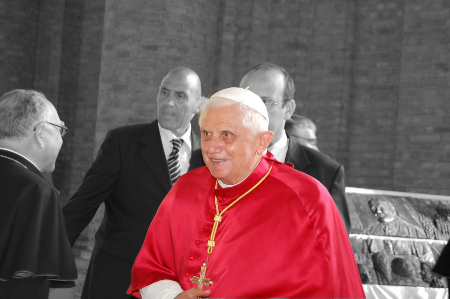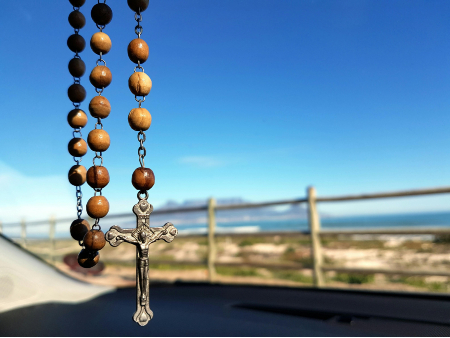 Hi readers, it seems you use Catholic Online a lot; that's great! It's a little awkward to ask, but we need your help. If you have already donated, we sincerely thank you. We're not salespeople, but we depend on donations averaging $14.76 and fewer than 1% of readers give. If you donate just $5.00, the price of your coffee, Catholic Online School could keep thriving. Thank you. Help Now >
Hi readers, it seems you use Catholic Online a lot; that's great! It's a little awkward to ask, but we need your help. If you have already donated, we sincerely thank you. We're not salespeople, but we depend on donations averaging $14.76 and fewer than 1% of readers give. If you donate just $5.00, the price of your coffee, Catholic Online School could keep thriving. Thank you. Help Now >
On Religions and World Peace
FREE Catholic Classes
Pakistani Bishop Sees a Common Anthropology
MILAN, Italy, SEPT. 13, 2004 (Zenit) - Here is the text of an analysis of religions and world peace offered by Bishop Anthony Lobo of Islamabad-Rawalpindi, in Pakistan. He delivered it Tuesday at the Men and Religions meeting in Milan.
* * *
Mr. Chairman and distinguished guests, I would like to expose this topic in these phases:
1. A common anthropology (humanism) underlying all religions
2. The roots of violence and wars
3. Religions as the healer of violence
The theme of this international meeting is "Religions and Cultures: The Courage for a New Humanism." I think that what is called "new humanism" is rather an anthropology common to all religions. Though I will use the Bible to explain this, I am sure that the anthropology I describe, based on the Bible, will be echoed by scholars of other religions.
What is this common anthropology? In the book of Genesis, the origin of creation is described as one of compassion, gentleness, peace and harmony. A later Hebrew word to describe this is "hesed," which indicates a harmonious relationship between God and human beings, between human beings themselves, between human beings and nature (including animals) and within the human person's own being.
Violence, including war, is a parody of creation because it replaced the fourfold harmonious relationship with a fourfold alienation: human beings alienated from God, from one another, from nature -- including animals -- and alienated from one's own self.
Religions can engage in dialogue, despite their differences, because they have a common anthropology. Though I spell this out using Christian Scriptures, I believe other religious scholars will find echoes in their own scriptures of the main characteristics of the common anthropology, the basis of a new humanism, for the healing of violence in our world of wars.
1. Common anthropology
Common anthropology begins with the creation of human beings. They were made in the image and likeness of God. The one God of Christianity is Father, Son and Holy Spirit. The life of God consists in the Father giving all to the Son: all his life, love, wisdom, power. The Son returns all to the Father. This mutual self-giving (self-emptying) is called the Holy Spirit (John 17:10).
Being made in God's image, the human person is, at the core and center of being, made for self-giving, which is love. Because God is essentially love (1 John 4:8) man was made for love. God made human beings male and female and blessed them and commanded them to be fruitful and multiply and fill the earth and subdue it and have dominion over the animals. This subduing the earth and dominion over the animals was characterized by kindness, gentleness, harmony and peace, in one French word: "douceur."
Since human beings were created before any of the religions we know existed, we can speak of an original anthropology, predating all religions. Hence I call it common anthropology. What are the characteristics of this common anthropology?
The first is truth. By this, I understand the correspondence of the human person with God. Made in God's image and likeness, the human person is true. As human beings lose their resemblance to the Divine Exemplar, they become less true.
The second characteristic of this common anthropology is equality. "Male and female he made them. He made them in his own image and likeness." Man and women are equal in dignity and their offspring, too, made in God's image and likeness, will be equal in dignity, rooted in their resemblance to their Creator.
The third characteristic is that human persons by nature are relational. Man and woman relate to one another, to God, and to others in creation. Each person has a wisdom open to the other. Each person is by essence, dialogical.
The fourth characteristic is gentleness (or love, harmony, kindness, peace) in French: "douceur." A negative word for this is "nonviolence." Man's mission to "subdue" the earth was a stewardship of caring, not a license to exploit and dominate.
2. Violence as a parody of creation
But, when Adam and Eve sinned, the whole situation changed so much that it resulted in a parody of creation. Instead of God's blessing, there was a curse on the ground. Instead of fruitfulness, the earth would bring fourth thorns and thistles.
Instead of being characterized by "douceur," "non-douceur," or violence, made its appearance. This does not mean that "douceur" completely disappeared. It was God's gift to the human being in creation and therefore our mission given with his blessing. Only now, after sin, all "douceur" is marked by violence and has to make its way along the road of violence, never outside it.
The first result of the fall of human beings came about when Truth was abandoned. Not content with resembling God, the human being wanted to be equal with God, the creature sought to compete with the Creator. Hence the human person became "false," and this would color all human thoughts, words and actions.
The second result of the fall of the human person was inequality: "Your yearning will be for your husband, and he will dominate you" (Genesis 3:16). This principle of inequality now entered the life of human beings and would extend its consequences in human relations.
The third consequence of the fall of human beings was alienation. The fourfold relational nature of human beings was replaced by fourfold alienation from self, from God, from other human beings and from nature.
Finally the chief characteristic of the human person gentleness (or "douceur") now changed to violence. There is a straight line from falsifying human nature to treating human beings unequally and from there to causing alienation from one's true nature and from alienation from others which finally necessitates attacking those others or defending oneself from attacks by resorting to violence.
3. Religion as the healer of violence
Cynics would snigger at this title. They can give many examples of wars caused by religions and even of "holy wars" (jihad), yet my topic is dialogue of religions in a world of wars. I believe this is not only possible but most necessary today.
My belief is based on experiences which prove it possible for religion to heal violence, specially in its systematic and structural form. I am not presenting you utopias but facts from recent history. These prove that on both the micro as well as macro level religion can indeed heal violence. So the dialogue of religions can heal the roots of violence and wars in our world today.
 Hi readers, it seems you use Catholic Online a lot; that's great! It's a little awkward to ask, but we need your help. If you have already donated, we sincerely thank you. We're not salespeople, but we depend on donations averaging $14.76 and fewer than 1% of readers give. If you donate just $5.00, the price of your coffee, Catholic Online School could keep thriving. Thank you. Help Now >
Hi readers, it seems you use Catholic Online a lot; that's great! It's a little awkward to ask, but we need your help. If you have already donated, we sincerely thank you. We're not salespeople, but we depend on donations averaging $14.76 and fewer than 1% of readers give. If you donate just $5.00, the price of your coffee, Catholic Online School could keep thriving. Thank you. Help Now >
My macro example is Mahatma Gandhi. I stressed that the fall of man did not destroy the "douceur" of the human race. It weakened it, but it remains God's gift to us and our mission to proceed with it along the road marked by violence. Let us see how Mahatma Gandhi did it.
Deep down in the psyche of people of South Asia there are two characteristics stressed by two religions: nonviolence ("ahimsa") by Buddhism and fasting by Jainism. So what I called characteristics of common anthropology (based on our resemblance to the divine exemplar) were stressed by these two religions (nonviolence by Buddhism and self-sacrifice by Jainism).
Mahatma Gandhi took these deep-felt traits of the South Asian psyche and used them for political ends: to free India from colonial rule. Needless to say, all the peoples of India (which today include Pakistan and Bangladesh) despite being of different religions (Hindus and Muslims) were touched to the very depths of their beings and followed Gandhi on the road to freedom.
Gandhi used another trait of common anthropology which I call Truth. By his Satyagarha (holding fast to truth) movement, he led tens of thousands of Hindus and Muslims in peaceful protests, which resulted in victory for unarmed people, whose only weapon was the Truth that all human persons are equal and no race should colonize or rule another.
And if we think that Gandhi's success was only limited to India and had no consequence for the rest of the world, then we must remember that what he did in India was replicated all over the world, first in the dismantling of the British Empire in other parts of Asia and Africa, and then that of the Dutch, French and Portuguese empires all over the world.
Martin Luther King Jr. used Gandhi's methods to fight for civil rights and to end segregation of Afro-Americans in the U.S.A. Nelson Mandela used these methods to dismantle apartheid in South Africa. Not bad for a man called "the naked fakir of India" by Winston Churchill. His methods dismantled the structural violence of colonialism, segregation and apartheid on three continents.
Let me close this macro example with a quote from Mahatma Gandhi himself. It is said that it is difficult to end the war in Palestine because both sides are practicing the Mosaic law of retaliation: "an eye for an eye and a tooth for a tooth."
Gandhi once said: "If everybody practices the law of an eye for an eye, then soon the whole world will go blind." If there are wars all over the world today, it means that by and large, people have become blind. The aim of this seminar in general and my talk in particular is to try to restore sight to the blind.
I conclude with two micro level examples. A letter came to my notice from someone inside Afghanistan. It was pathetic. It asked: "For 30 years all I see in my country is war, killings, hatred and revenge. Are there no people who believe in peace, who respect life, who practice love and forgiveness?"
This letter arrived in Pakistan and a reply was sent to the writer giving the names of some Afghan refugees who went back to their country after years of contact with a group of persons (Christians and Muslims) who, despite religious differences, practiced and shared their experiences of those very things which the letter from Afghanistan cried out for: peace, life, love and forgiveness. Now that he is in touch with those people, he is very happy.
The last example is of a group of seven Muslims who regularly engage in dialogue with deeply committed Christians. I attended a meeting where they shared their experiences. Four were Afghan refugees. One said: "My wife asked me one day: What is wrong with you? You treat me very kindly of late." The reason for this was that he met regularly with Christians who practiced the spirituality of unity, love and forgiveness.
Another Afghan refugee who also attended this meeting said: "My wife said: Every week you attend some meeting. I would also like to attend these meetings with you." Yet these Afghan refugees began their sharing by saying: "We are Muslims and we believe in the Koran. But we practice the spirituality of unity, love and peace."
Finally, a third Muslim from Pakistan shared that he was always busy and did not get much time to stay at home, but he also practiced the spirituality of unity because he belonged to the group of Christians and Muslims who did the same.
One day he arrived home but soon after he had to leave for business in another city. On the way, while driving his car, his mobile (cell) phone rang. It was his wife, scolding for half an hour, for [his] not spending much time at home. When he reached his destination at night she rang again but this time to apologize for scolding him.
I end by saying that I firmly believe that if such dialogue of religions continues and spreads, both on the macro and micro levels, then all systemic and structural injustices will be eliminated, and wars in our world will cease.
Contact
Catholic Online
https://www.catholic.org
CA, US
Catholic Online - Publisher, 661 869-1000
info@yourcatholicvoice.org
Keywords
Religion, Peace, Pakistan, humanism
More Catholic PRWire
Showing 1 - 50 of 4,716
A Recession Antidote
Randy Hain
Monaco & The Vatican: Monaco's Grace Kelly Exhibit to Rome--A Review of Monegasque-Holy See Diplomatic History
Dna. Maria St. Catherine Sharpe, t.o.s.m., T.O.SS.T.
The Why of Jesus' Death: A Pauline Perspective
Jerom Paul
A Royal Betrayal: Catholic Monaco Liberalizes Abortion
Dna. Maria St.Catherine De Grace Sharpe, t.o.s.m., T.O.SS.T.
Embrace every moment as sacred time
Mary Regina Morrell
My Dad
JoMarie Grinkiewicz
Letting go is simple wisdom with divine potential
Mary Regina Morrell
Father Lombardi's Address on Catholic Media
Catholic Online
Pope's Words to Pontifical Latin American College
Catholic Online
Prelate: Genetics Needs a Conscience
Catholic Online
State Aid for Catholic Schools: Help or Hindrance?
Catholic Online
Scorsese Planning Movie on Japanese Martyrs
Catholic Online
2 Nuns Kidnapped in Kenya Set Free
Catholic Online
Holy See-Israel Negotiation Moves Forward
Catholic Online
Franchising to Evangelize
Catholic Online
Catholics Decry Anti-Christianity in Israel
Catholic Online
Pope and Gordon Brown Meet About Development Aid
Catholic Online
Pontiff Backs Latin America's Continental Mission
Catholic Online
Cardinal Warns Against Anti-Catholic Education
Catholic Online
Full Circle
Robert Gieb
Three words to a deeper faith
Paul Sposite
Relections for Lent 2009
chris anthony
Wisdom lies beyond the surface of life
Mary Regina Morrell
World Food Program Director on Lent
Catholic Online
Moral Clarity
DAN SHEA
Pope's Lenten Message for 2009
Catholic Online
A Prayer for Monaco: Remembering the Faith Legacy of Prince Rainier III & Princess Grace and Contemplating the Moral Challenges of Prince Albert II
Dna. Maria St. Catherine Sharpe
Keeping a Lid on Permissiveness
Sally Connolly
Glimpse of Me
Sarah Reinhard
The 3 stages of life
Michele Szekely
Sex and the Married Woman
Cheryl Dickow
A Catholic Woman Returns to the Church
Cheryl Dickow
Modernity & Morality
Dan Shea
Just a Minute
Sarah Reinhard
Catholic identity ... triumphant reemergence!
Hugh McNichol
Edging God Out
Paul Sposite
Burying a St. Joseph Statue
Cheryl Dickow
George Bush Speaks on Papal Visit
Catholic Online
Sometimes moving forward means moving the canoe
Mary Regina Morrell
Action Changes Things: Teaching our Kids about Community Service
Lisa Hendey
Easter... A Way of Life
Paul Spoisite
Papal initiative...peace and harmony!
Hugh McNichol
Proclaim the mysteries of the Resurrection!
Hugh McNichol
Jerusalem Patriarch's Easter Message
Catholic Online
Good Friday Sermon of Father Cantalamessa
Catholic Online
Papal Address at the End of the Way of the Cross
Catholic Online
Cardinal Zen's Meditations for Via Crucis
Catholic Online
Interview With Vatican Aide on Jewish-Catholic Relations
Catholic Online
Pope Benedict XVI On the Easter Triduum
Catholic Online
Holy Saturday...anticipation!
Hugh McNichol
We ask you, humbly: don't scroll away.
Hi readers, it seems you use Catholic Online a lot; that's great! It's a little awkward to ask, but we need your help. If you have already donated, we sincerely thank you. We're not salespeople, but we depend on donations averaging $14.76 and fewer than 1% of readers give. If you donate just $5.00, the price of your coffee, Catholic Online School could keep thriving. Thank you.Help Now >













 Daily Readings for Wednesday, April 17, 2024
Daily Readings for Wednesday, April 17, 2024 St. Anicetus: Saint of the Day for Wednesday, April 17, 2024
St. Anicetus: Saint of the Day for Wednesday, April 17, 2024 Prayer to Love God above all Things: Prayer of the Day for Wednesday, April 17, 2024
Prayer to Love God above all Things: Prayer of the Day for Wednesday, April 17, 2024
